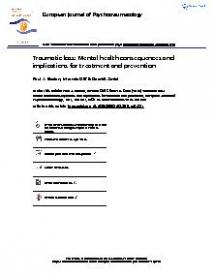Traumatic loss : Mental health consequences and implications for treatment and prevention
Traumatic loss involves the loss of loved ones in the context of potentially traumatizing circumstances and is a commonly reported traumatic event. It may give rise to disturbed grief, called prolonged grief disorder (PGD) in ICD-11 and persistent complex bereavement disorder (PCBD) in DSM-5, combined with posttraumatic stress disorder (PTSD) and depression. The recent inclusion of grief disorders in both DSM-5 and ICD-11 have spurred research on griefrelated psychopathology. This special issue on traumatic loss includes 10 articles and two letters. Topics addressed include diagnostic criteria for PGD, children’s perspectives on life after parental intimate partner homicide, and the impact of visiting the site of deaths caused by terror. Early indicators of problematic grief trajectories are addressed, as well as moderators and mediators of disordered grief, including coping strategies, rumination, and meaning-making. Further, a meta-analysis synthesizing research findings on correlates of disturbed grief following traumatic loss is presented. Finally, specialized treatments as Eye Movement Desensitisation and Reprocessing (EMDR) and Cognitive Behavioural Therapy (CBT) for grief are addressed, and predictors of treatment response for CBT for PGD including levels of self-blame and avoidance are scrutinized. As such, the articles included in this special issue increase our understanding of the needs of people confronted with traumatic loss and bring promising findings with regard to diagnosis, prevention, and specialized treatment in children, young people and adults. This article also introduces a hypothetical staging, profiling, and stepped care model which may offer a template to integrate existing and emerging research findings on possible courses and correlates of grief, in order to inform treatment decisions.
Geachte bezoeker,
De informatie die u nu opvraagt, kan door psychotraumanet niet aan u worden getoond. Dit kan verschillende redenen hebben,
waarvan (bescherming van het) auteursrecht de meeste voorkomende is. Wanneer het mogelijk is om u door te verwijzen naar de bron
van deze informatie, dan ziet u hier onder een link naar die plek.
Als er geen link staat, kunt u contact opnemen met de bibliotheek,
die u verder op weg kan helpen.
Met vriendelijke groet,
Het psychotraumanet-team.
In: European Journal of Psychotraumatology ISSN: 2000-8198 (Print) 2000-8066 (Online) | 10 | 1 | 1591331
https://www.tandfonline.com/doi/full/10.1080/20008198.2019.1591331
Open Access


